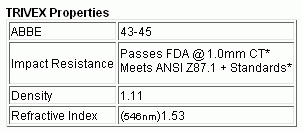Expert Advice on Prescription Shooting Glasses
Danny Reever recently researched the options for shooters who need corrective lenses. Danny writes: “My eyes were checked last week, and I needed a new prescription. After doing some online research, I received an email from a fellow shooter who happens to be an optician. He gave me sound advice and technical facts and figures. My local optician later concurred with everything the fellow shooter/optician suggested. Here are the key things I learned:
 CHOICE of MATERIALS
CHOICE of MATERIALS
Shooting glasses need to be shatterproof. You basically have only two choices in shatterproof materials: Polycarbonate, or Trivex™ made by PPG. Most optical shops will favor Polycarbonate, because that’s what they sell the most of. However Poly is far from the best material in terms of optical properties. Glass is the best for optical clarity and lack of distortion, with an ABBE number of about 58 (the measurement of chromatic aberration, higher being better). Unfortunately glass lenses are heavy, (glass has a Specific Gravity number of about 2.50–the higher number the more weight). Worse yet, glass shatters. With conventional glass lenses, if a cartridge lets go at 60,000 PSI, you could lose an eye, or worse.
Polycarbonate is very strong and shatter resistant. Unfortunately it only has an ABBE number of 30. This is not great optically, especially when you are looking off-axis. Poly, however, is much lighter than glass. Poly has a Specific Gravity number of about 1.20.
So that leaves PPG Trivex™. Trivex is very strong AND very light, and rates well optically. Trivex™ is nearly as strong as Polycarbonate, yet is even lighter (with a Specific Gravity of 1.11). With an ABBE number of about 45, Trivex™ is much better optically than Polycarbonate. In addition, Trivex™ is chemically resistant to cleaning solutions, oil, and skin care products. Trivex™ can be drilled, grooved and notched very easy, so it is well-suited for rimless glasses and sport glasses. Click for TriVex Lens Report.

LENS COATINGS and FEATURES
I was told to go with a very high-quality, anti-reflective coating. I also ordered ‘Transitions’ photochromatic coating to eliminate the need for extra sunglasses. (However, a ‘Transitions’ coating may not work well as driving glasses since most automobile windshields are tinted to block the UV rays that trigger the transitions effect.)
I ordered a no-line bifocal. This was a compromise in itself since having a single focal plane for shooting might be a better bet, but then you may be forced to buy two pairs of glasses. Your lens prescription can also be optimized for scope-viewing by having the viewing axis ground off-center. But then again you may need a second pair for everyday use.
CONCLUSION
The experts told me that, as far as eyeglasses are concerned, ‘Everything in optics is a trade-off…there is NO perfect answer’. Pick a good licensed optician that is familiar with ALL the options available to you. Do not deal with a ‘frame stylist’ unless being trendy or pretty is your only goal. The fellow shooter/optician gave me this advice: ‘Good opticians, like good gunsmiths, are not cheap in the short run, but always cheaper long term’. Remember, you only have one pair of eyes, so protecting them must be the first priority (remember the trade offs), otherwise you are playing ‘Russian Roulette’ every time you pull the trigger.”


















my last pair cost me $13 including shipping.
try zennioptical.com.
i don’t own stock (think it’s private,anyway)
and i don’t work for them…..i’m just cheap.
also, i did an experiment: the first set of
prescription glasses i received were perfect.
i duplicated the procedure: ordered the same
style, same everything. BOTH are perfect.
so……..this is how it works:
i have two sets ($26). one for mowing the yard,
chain sawing, or other possible glasses-damaging activity
like cooking (i sling the ingredients and it shows).
i have an “extra” one for travel (at $13, it doesn’t
hurt to have an spare). Then, for shooting, i use
my $312 glasses. based on recent scores, i am
tempted to try the cheap glasses.